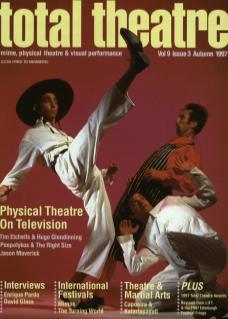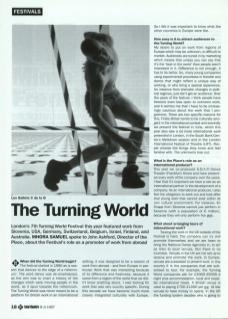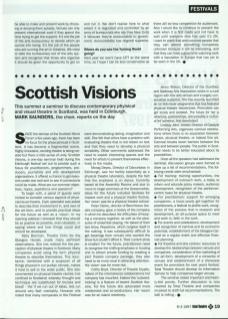When did the Turning World begin?
The festival started in 1990 as 'a season that dances to the edge of a millennium'. The word dance was de-emphasised, as the aim was to chart a history of the changes which were moving people in the world, as it spun towards the millennium. The Turning World was never meant to be a platform for British work in an international setting, it was designed to be a season of work from abroad – and from Europe in particular. Work that was interesting because of its difference and freshness, because it came from a region of the world that we didn't know anything about. I was looking for work that was very country-specific. During this decade we have become much more closely integrated culturally with Europe. So I felt it was important to know what the other countries in Europe were like.
How easy is it to attract audiences to the Turning World?
My desire to put on work from regions of Europe which may be unknown, is difficult to market. Audiences are tuned in by marketing which means that unless you can say that it's ‘the best in the world' then people aren't interested in it. Difference is not enough, it has to be better. So, many young companies using experimental processes in theatre and dance that might reflect a unique way of working, or who bring a special experience, for instance from dramatic changes in political regimes, just don't get an audience. Over the years of the festival, I think people have become even less open to unknown work, and it worries me that I have to be increasingly cautious about the work that I programme. There are two specific reasons for this. Firstly Britain tends to be culturally arrogant in the international context and secondly we present the festival in June, which this year also saw a lot more international work presented in London, in the South Bank Centre's Meltdown season and in the London International Festival of Theatre (LIFT). People choose the things they know and feel familiar with. The unknowns lose out.
What is the Place's role as an international producer?
This year we co-produced S.O.A.P. Dance Theater (Frankfurt)'s Khora and have presented every work of the company over the years. I feel that it's important we have a role as an international partner in the development of a company. As an international producer, I also feel the obligation to seek out and look after that young work that cannot exist within its own cultural environment. For instance, En Knapp from Slovenia cannot just perform in Slovenia (with a population of 6 million), because they will only perform five gigs.
What about arranging tours of international work?
Touring the work in the UK outside of the Festival is hard. The company can try and promote themselves and we are keen to bring the National Dance Agencies in, to act as links to local venues. But there is no incentive. Venues in the UK are not set up to receive and promote the work. In Europe, venues are subsidised to present work. In this country it is the companies that are subsidised to tour. For example, the Turning World companies ask for £2000-5000 a night plus accommodation, local and possibly international travel. A British venue is used to paying £700-1000 per gig. I'd like venues to have money to spend. In the UK the funding system decides who is going to be able to make and present work by choosing or denying them subsidy. Venues can only present international work if they spend the time trying to get the support. It's not the job of the arts bureaucracy to decide which art comes into being. It's the job of the people who are running the art in theatres. We need to take the bureaucracy out of the arts system and recognise that those who organise it should be given the opportunity to get on and run it. We don't realise here to what extent it is regulated and controlled by an army of bureaucrats who say they have to do it because they're accountable to government. Accountability has reigned supreme.
Where do you see the Turning World going?
Next year we won't have LIFT at the same time, so I hope I can be less conservative as there will be less competition for audiences. Also I would like to continue to present the work when it is first made and not have to wait until everyone else has said it's OK. I want to crack that and convince people that they can attend something completely unknown because it will be interesting, and that they can have a good time watching work with a reputation in Europe that has yet to be seen in the UK.


